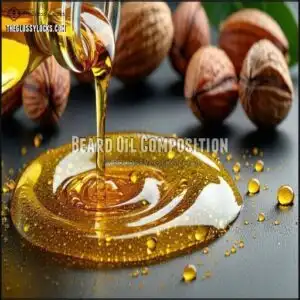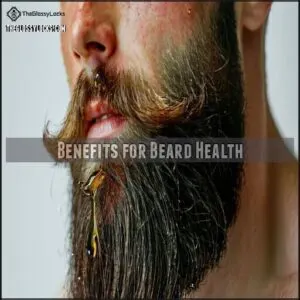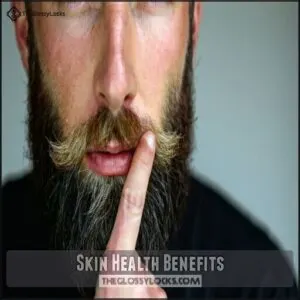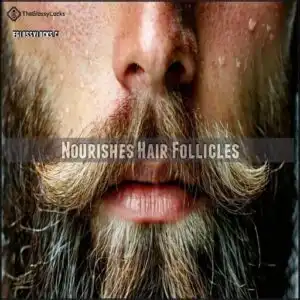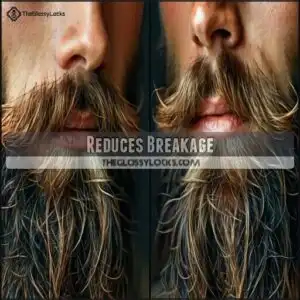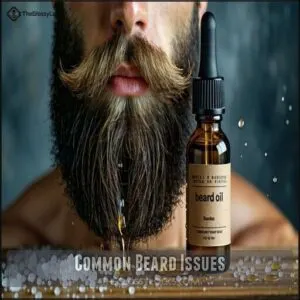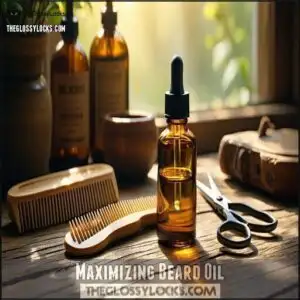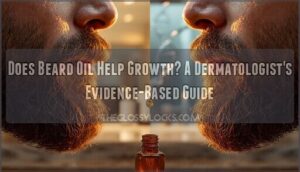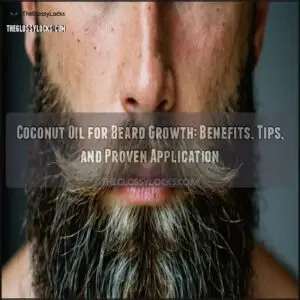This site is supported by our readers. We may earn a commission, at no cost to you, if you purchase through links.
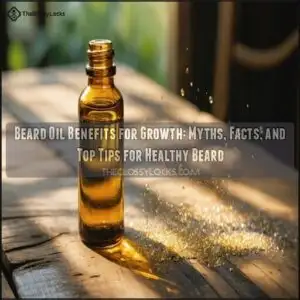
Its blend of carrier oils, like jojoba or argan, and essential oils hydrates both your beard and the skin underneath.
Well-moisturized skin reduces itchiness and flakes (beard dandruff), which keeps your beard looking full instead of patchy.
While there’s no hard science linking beard oil to hair growth, ingredients like vitamin E support healthier follicles, and healthy follicles mean less breakage.
Think of it as feeding your beard the nutrients it needs to thrive. Curious about what oils work best? Keep reading for insights.
Table Of Contents
- Key Takeaways
- Beard Oil Composition
- Benefits for Beard Health
- Skin Health Benefits
- Beard Growth Myths
- Choosing Right Ingredients
- Applying Beard Oil
- Beard Oil and Hair
- Common Beard Issues
- Maximizing Beard Oil
- Long Term Benefits
- Frequently Asked Questions (FAQs)
- What are the benefits of Beard oil?
- Does oil help a beard grow?
- Does Beard oil help a patchy beard?
- How does Beard oil work?
- Does Beard oil make a beard thicker?
- Can beard oil protect against environmental damage?
- Is beard oil safe for use on dyed beards?
- Can beard oil help with ingrown hairs?
- Are there best practices for oily skin users?
- Conclusion
Key Takeaways
- It doesn’t directly grow your beard, but it keeps your skin and hair healthy, reducing dryness and breakage.
- Hydrated skin and nourished follicles create the ideal environment for stronger, fuller-looking beard growth.
- Regular use softens coarse hair, relieves itchiness, and prevents dandruff, improving your beard’s overall appearance.
- Ingredients like jojoba and vitamin E support follicle health and help maintain a healthier, well-groomed beard over time.
Beard Oil Composition
Beard oil is a blend of carrier oils, essential oils, and sometimes vitamin E, each playing a specific role in nourishing your beard and skin.
Carrier oils like jojoba and argan provide hydration, while essential oils add fragrance and potential skin benefits.
Carrier Oils Benefits
Carrier oils are the backbone of beard oil ingredients, providing hydration and nourishment.
They facilitate oil absorption without clogging pores, thanks to low comedogenic ratings.
Jojoba, argan, and coconut oils are popular for their stability and suitability for all skin types.
These oils condition hair, soften beards, and support healthy growth, making them essential in beard growth oil formulations.
Essential Oils Role
While carrier oils do the heavy lifting, essential oils add flair with unique scent profiles and therapeutic properties.
Extracted through methods like steam distillation, they’re potent and must be used carefully.
Essential oils in beard oil, such as tea tree or peppermint, offer antibacterial benefits and a revitalizing aroma.
A proper blending guide guarantees oil safety and enhances beard oil benefits.
Vitamin E Oil Importance
Vitamin E oil is a powerhouse among beard oil ingredients.
Its antioxidant properties protect against lipid peroxidation, keeping oils fresh and effective. By preventing rancidity, it guarantees your beard growth products stay potent.
Vitamin E also nourishes the skin, strengthens follicles, and supports healthier hair. It’s a key player in maximizing beard oil benefits for both skin and beard health.
Benefits for Beard Health
Beard oil improves the health of your beard by softening the hair, reducing itchiness, and preventing dandruff.
Softens beard hair, relieves itch, and prevents dandruff—beard oil is your secret to a healthier, well-groomed beard.
Its hydrating and nourishing ingredients promote a smoother, healthier appearance while keeping the skin beneath moisturized.
Softens Beard Hair
Beard oil works wonders for taming coarseness and reducing roughness in facial hair.
It acts as a beard moisturizer, improving texture and enhancing shine without feeling greasy.
Its conditioning properties soften even the wiry strands, making grooming much easier.
With regular use, you’ll notice improved manageability and a smoother, more polished appearance—one of the key beard oil benefits you’ll love, which includes improved manageability.
Reduces Itchiness
Itchiness often strikes when sharp beard edges irritate your skin or dryness sets in. Applying beard oil for beard itch offers immediate relief by reducing inflammation and locking in moisture.
To combat itchiness effectively: A common cause can be seborrheic dermatitis.
- Apply oil daily after washing your face.
- Massage evenly to reach the skin underneath.
- Opt for oils with anti-inflammatory properties to address underlying conditions.
Prevents Dandruff
Dry skin relief is key to tackling beard dandruff.
Beard oil hydrates the skin beneath your beard, reducing flakiness and soothing beard itch.
Its anti-fungal properties help maintain scalp health, preventing buildup that leads to flakes.
By locking in moisture, beard oil for beard dandruff guarantees hydration benefits while keeping your beard itch-free and your skin healthy under all that scruff.
Skin Health Benefits
Beard oil doesn’t just benefit your beard—it keeps the skin underneath healthy too.
By moisturizing, preventing acne, and soothing irritation, it creates the perfect foundation for a strong, itch-free beard.
Moisturizes Skin
Keeping your skin hydrated beneath your beard isn’t just about comfort—it’s about skin health too.
Beard oil acts as a beard moisturizer, locking in hydration benefits while preventing dryness that can lead to irritation relief.
By nourishing the skin, it supports healthy blood flow and reduces oil buildup, creating a foundation for better beard growth and overall beard moisturization.
Prevents Acne
Maintaining oil balance is key for skin health, especially under your beard.
The right beard oil for acne uses noncomedogenic oils, preventing pore clogging while promoting skin cleansing and acne reduction.
Look for these ingredients:
- Jojoba oil for sebum regulation
- Tea tree oil to fight bacteria
- Evening primrose for inflammation
- Argan oil to hydrate
- Vitamin E for healing
Soothes Irritation
After tackling acne, let’s focus on calming irritated skin.
Beard oil works wonders for redness reduction and post-shave relief.
Its anti-inflammatory properties soothe beard itch and irritation, improving comfort.
Essential oils like tea tree or lavender help with inflammation control, while carrier oils moisturize sensitive skin.
Regular use combats beard dandruff and guarantees healthier, itch-free skin beneath your beard.
| Benefit | Ingredient | How It Helps | Skin Type |
|---|---|---|---|
| Redness Reduction | Tea Tree Oil | Calms inflamed areas | Sensitive/Oily |
| Post-Shave Relief | Jojoba Oil | Moisturizes, reduces itch | All Skin Types |
| Inflammation Control | Lavender Oil | Soothes irritation | Dry/Normal |
| Comfort Improvement | Argan Oil | Hydrates, fights dandruff | All Skin Types |
Beard Growth Myths
You’ve probably heard that beard oil can magically make your beard grow faster, but that’s not exactly true.
While it doesn’t directly stimulate growth, it creates a healthy environment for your beard to thrive.
No Direct Stimulation
Beard oil won’t directly trigger hair follicles or influence your natural growth cycle.
Genetics and hormonal influences like testosterone dictate your beard’s potential.
While beard oil offers benefits like hydration and nourishment, its effectiveness lies in supporting overall skin health, not changing growth patterns.
Managing expectations and embracing genetic predisposition are key beard growth tips for better results.
Healthy Environment
A healthy environment is essential for beard growth. Beard oil supports this by improving Skin Hydration and Follicle Strength. It creates ideal conditions for healthy beard growth without clogging pores or causing Oil Buildup.
- Enhances Blood Flow through gentle massage.
- Keeps skin moisturized to prevent dryness.
- Reduces Breakage by softening hair.
- Combats itchiness and flakiness.
- Promotes overall beard health.
Genetic Factors
While a healthy environment supports growth, genetics call the shots regarding your beard’s potential.
Family history, hormones like testosterone, and DHT influence your beard’s thickness and coverage.
Beard growth genetic factors explain variations across ethnicities and individuals, and genetic predisposition shapes your unique growth pattern.
Meaning no oil or trick can outdo the growth potential written in your DNA.
Choosing Right Ingredients
Choosing the right ingredients for beard oil guarantees it’s both effective and safe for your skin.
Focus on natural carrier oils, essential oils, and avoid products with harsh chemicals to promote healthy growth and minimize irritation, ensuring healthy beard care.
Carrier Oil Selection
Choosing the best carrier oils for your beard oil means focusing on comedogenic ratings, oil stability, and absorption rates.
Jojoba oil works for most skin types, mimicking natural sebum. Argan oil, rich in antioxidants, nourishes deeply.
Coconut oil hydrates but may clog pores on sensitive skin. For those interested, you can find various beard products.
Prioritize sourcing quality oils to guarantee effectiveness and compatibility with your skin, considering factors like oil stability.
Essential Oil Combinations
Discovering the right essential oils isn’t just about scent profiles—it’s about therapeutic effects too.
Lavender and tea tree offer calming sensations, while rosemary energizes and boosts circulation for beard growth.
Understanding complex oil interactions can enhance the blend’s effectiveness.
Aim for proper oil synergy by blending ratios of 5-10 drops essential oil per 2-4 tablespoons carrier oils.
Always prioritize safety concerns when choosing natural ingredients for your custom beard oil mix.
Avoiding Harsh Chemicals
After crafting the perfect scent blend, focus on avoiding irritants.
Chemicals like artificial fragrances, dyes, and preservatives can trigger beard oil allergies or irritation. Stick to natural ingredients to protect your skin and beard.
- Identify irritants by reading labels carefully.
- Choose natural alternatives, like oils free of additives.
- Practice DIY safety when blending at home, avoiding harsh chemicals.
Applying Beard Oil
Applying beard oil correctly helps moisturize both your beard and the skin underneath, keeping them healthy and itch-free.
Start with a few drops, massage it evenly into a clean, damp beard, and use your hands or a comb to guarantee thorough coverage.
Daily Application
Beard oil works best with a consistent routine. Apply it after a shower when your pores are open, ensuring maximum absorption.
Start with a few drops and spread evenly, massaging into the skin beneath. Daily application improves beard care, reducing dryness and itch.
Avoid over-application to prevent greasiness, and enjoy the benefits of proper beard oil uses for healthier beard growth.
Amount to Use
The amount of beard oil depends on your beard length and thickness.
Short beards need 2–3 drops, while longer or thicker ones may take up to 10–12 drops.
Start small—overdoing leads to a greasy appearance.
Application frequency and oil absorption also matter, so adjust as needed.
Regular use guarantees proper hydration, a key in beard oil application and healthy beard growth.
Massaging Techniques
After applying beard oil, massage using circular motions to facilitate even absorption.
Use gentle upward strokes to stimulate beard growth and blood flow.
Focus on pressure points under the jawline and near the cheeks.
For better precision, a boar bristle brush can help.
Frequent massages during beard oil application improve beard care, promoting healthier hair growth and a softer texture, which enhances overall hair growth.
Beard Oil and Hair
Beard oil nourishes your hair follicles, keeping them hydrated and healthy. It creates the ideal conditions for strong growth while reducing breakage and split ends.
Nourishes Hair Follicles
A good beard oil nourishes hair follicles by delivering nutrients right where they’re needed.
This strengthens roots, prevents weakening, and supports better follicle health. Plus, with consistent use, it improves density, making your beard look thicker and healthier.
By hydrating and conditioning, beard oil creates the perfect environment for ideal beard follicle growth and overall beard nourishment.
It can also add shine to the hair.
Promotes Healthy Growth
Healthy follicles mean healthier, stronger hair.
Using beard oil for growth supports this by improving skin hydration and boosting blood flow to the area.
Here’s how it creates an environment for stimulating beard growth:
- Mimics natural skin oils for balance.
- Reduces breakage with nourishment.
- Promotes beard follicle growth consistency.
- Enhances absorption for deeper care.
- Maintains ideal skin conditions.
Reduces Breakage
Stronger hair starts with healthy follicles.
Stronger hair begins with nourished follicles, paving the way for a healthier, softer, and more resilient beard over time.
Beard oil minimizes beard breakage by offering hydration benefits that improve elasticity and repair split ends.
A well-moisturized beard is less prone to snapping or fraying, leaving it softer and smoother.
Using beard strengthening oil regularly creates a protective layer, reducing beard split ends and promoting beard growth while keeping your beard looking fuller and healthy.
Common Beard Issues
Beard issues like dandruff, itchiness, and patchiness are common, but they don’t have to be a struggle.
With the right care, beard oil can help address these problems by hydrating the skin, reducing irritation, and promoting a healthier beard.
Beard Dandruff Solution
Beard dandruff, or "beardruff," often stems from dry skin and poor exfoliation.
To tackle it, hydrate your skin and beard with proper care.
- Identify causes: Dryness or product buildup are common culprits.
- Treatment options: Use beard oil for beard dandruff relief and skin hydration.
- Preventative measures: Regular exfoliation benefits skin health, preventing flakes while supporting effective beard care.
Itchiness Relief
When beard itch strikes, applying beard oil can bring immediate relief.
Dry skin and sharp hair edges are common underlying causes of this irritation. Use 3-5 drops, focusing on sensitive skin areas.
Adjust application frequency for comfort. The ingredient synergy of jojoba and coconut oils hydrates skin, soothing itchiness effectively.
Beard oil benefits your beard and the skin beneath.
Patchy Beard Treatment
Struggling with a patchy beard? Beard oil can help nourish hair follicles and create a healthier growth cycle, though patience is required.
Consistent oil coverage boosts blood flow while hydrating skin. Pair beard growth oil with lifestyle factors like good sleep and a balanced diet.
Though genetics play a role, using beard thickness oil aids a fuller appearance over time.
Addressing blocked hair follicles through exfoliation can also promote growth.
Maximizing Beard Oil
You can get the most out of beard oil by combining it with complementary products and tailoring your routine to your needs.
Exploring DIY recipes and creating custom fragrances lets you adapt the benefits to suit your beard and skin.
Combining With Other Products
Don’t stop at just beard oil—boost your beard care routine by pairing it with beard balm or beard wax for hold and shape.
Use beard shampoo and face wash to clean the skin and hair, removing buildup that blocks beard growth.
Moustache wax adds a polished touch. Many users find beard grooming products particularly helpful.
Combining these creates a complete approach to beard care.
DIY Recipes
For a DIY beard oil, start with great base oil choices, like jojoba or argan, for nourishing hydration.
Blend 2-4 tablespoons of carrier oils with 5-10 drops of essential oils, customizing the recipe to your needs.
Tailor ingredients for specific benefits, from itch relief to moisturizing. Store your creation in an amber glass bottle, ensuring freshness and longevity.
Customizing Fragrance
When crafting scented beard oil, mix essential oils for a unique fragrance.
Use scent layering with essential pairings like cedarwood and vanilla for warmth or citrus for freshness.
Seasonal scents, like spice in winter, add variety.
Adjust fragrance intensity by altering drops. Experiment to match your mood—your beard fragrance should be as distinctive as you, with scents that reflect your personality, making it unique.
Long Term Benefits
When you stick with beard oil over time, you’ll notice healthier, stronger facial hair that’s easier to maintain.
Regular use promotes a well-hydrated beard and skin, reducing common issues like dryness, itchiness, and breakage.
Consistent Use Results
Using beard oil consistently in your beard care routine guarantees long-term hydration, enhanced softness, and reduced breakage.
Over time, you’ll notice improved manageability and a healthier appearance, making beard growth results more satisfying.
Beard oil benefits aren’t instant, but regular use sets the foundation for steady improvements. Stick with it, and your beard will thank you for its newfound liveliness.
Healthy Beard Maintenance
Maintaining a healthy beard requires consistent grooming and care.
A solid beard care routine includes daily grooming and proper trimming techniques to shape your beard.
Use beard washing and styling products to keep it clean and manageable.
Select a quality comb to evenly distribute beard oil, guaranteeing hydration and nourishment for maximum beard health and long-term maintenance.
- Daily grooming ensures consistency
- Trimming techniques shape effectively
- Beard washing keeps it fresh
- A quality comb distributes beard oil well
Enhanced Appearance
To make your beard look stylish and neat, beard oil works wonders.
It boosts manageability, tames flyaways, and creates a fuller beard with a soft, healthy shine.
Consistent use enhances your beard appearance, making it smoother and more polished.
A balanced diet supports essential beard growth.
Adding beard softness and fullness, it’s like giving your beard a makeover—hydrated, nourished, and ready to impress with a healthy shine.
Frequently Asked Questions (FAQs)
What are the benefits of Beard oil?
Think beard oil is just fancy cologne for your face? Nope.
It hydrates your skin, softens scraggly bristles, tames dandruff, and improves manageability, making your beard look fuller and healthier.
It’s skincare and grooming in one.
Does oil help a beard grow?
Oil doesn’t directly stimulate beard growth, but it keeps your skin healthy and hydrated, reducing dryness and breakage.
By creating ideal conditions, oils like jojoba and argan support stronger, fuller-looking beard growth over time.
Does Beard oil help a patchy beard?
A patchy beard isn’t the end of the road—it’s just a detour.
Beard oil hydrates your skin, reduces dryness, and creates healthier conditions for beard growth, helping those sparse areas look fuller over time.
How does Beard oil work?
Beard oil hydrates your skin, softens beard hair, and reduces itchiness by mimicking natural oils.
Its carrier oils nourish the follicles, while essential oils add fragrance, creating a healthier environment for your beard to thrive.
Does Beard oil make a beard thicker?
Rome wasn’t built in a day, and neither is a thicker beard.
Beard oil doesn’t make your beard thicker directly, but it hydrates, reduces breakage, and supports healthy growth for a fuller appearance over time.
Can beard oil protect against environmental damage?
Using beard oil creates a protective barrier, shielding your beard and skin from environmental factors like harsh winds, pollutants, and UV damage.
Its antioxidants and moisturizers keep your beard healthy, soft, and resilient daily.
Is beard oil safe for use on dyed beards?
Think of it as a gentle hug for your beard—yes, beard oil is safe for dyed beards.
It hydrates, nourishes, and protects without stripping color, especially when free of harsh chemicals or alcohol.
Can beard oil help with ingrown hairs?
Yes, it can! Beard oil softens hair and hydrates skin, reducing inflammation and irritation that cause ingrown hairs.
Massaging it improves circulation, helping hairs grow properly instead of curling back into the skin, which is a key factor in preventing ingrown hairs.
Are there best practices for oily skin users?
If you’ve got oily skin, pick non-comedogenic formulas with lightweight oils like jojoba.
Apply just 2-3 drops after cleansing to avoid greasiness.
Spread evenly, focusing on the beard ends, not the skin underneath.
Conclusion
Think of beard oil as fertilizer for a garden—while it won’t make your beard miraculously grow, it fosters the ideal conditions for healthier, stronger facial hair.
By hydrating your skin, softening your beard, and preventing dandruff, it helps maintain fullness and reduces breakage.
Though beard oil benefits for growth aren’t scientifically proven, its nutrients, like vitamin E, support follicle health and help your beard thrive long-term by giving it the care it needs.

